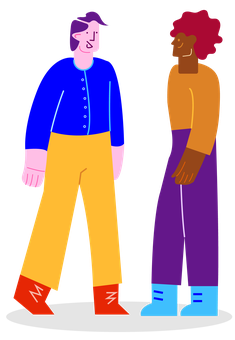Three people with lived experience of homelessness shared their experiences of racism, and recommendations to services, for this guidance. Names have been changed.
Nour's experience
Nour claimed asylum in the UK and spent time in Home Office accommodation.
“We face this every day. It’s really very sad and makes us feel helpless.”
From being on public transport, to accessing health care and staying in temporary accommodation, Nour shared many examples of times where she was made to feel different, exposed or uncared for. There are explicit racist incidents of people pushing and kicking her chair on the bus, sticking two fingers up for no reason and staff shouting out personal details in communal areas. In addition, Nour shared that in the accommodation there were no halal or even vegetarian food available.
“If we don’t eat, they don’t care.”
In addition, there was no access to a prayer room, which meant religious practices had to take place in a corner, in front of everyone.
“There is never any privacy, we always feel exposed.”
Ayo's experience
Ayo has been supported by several different homelessness services
“A lot of people in the sector hold stereotypes about people who look non-white. And the level of service you get drops then and there. There is no empathy for People of Colour.”
Ayo’s experiences of racism centre around prejudices which exist based on having a non-white name, a non-English accent and looking different. The issues they have encountered have often been related to language and not picking up everything that’s being said, which makes it harder to fully engage with the service.
“I’m not stupid. I don’t understand everything you’re saying, maybe your accent, your vocabulary, speaking too fast. When I ask them to repeat it, they can get really annoyed, passive aggressive and just so many things you hear in their tone.”
There are also experiences of people not being given help either because staff don’t think they deserve it or because they are ‘strong’ and don’t need the help. Ayo shared that they had to stay in a hostel for a longer period because there was an assumption that they could manage.
“I needed to make myself more vulnerable to get help. You don’t get help when you’re strong.”
Ashley's experience
Ashley is a mother to four children. Ashley was forced into homelessness following a series of race-related issues. She turned to the Local Authority for help, but the road to housing was not easy and was filled with further experiences of racism. The most significant of which was the fact that Ashley was never referred to any services for additional support and spent months advocating for herself and her children to be housed together. Ashley believes that this related to assumptions about her being a ‘strong Black woman’ who could manage alone.
“The Ashley that trusted that a system existed to help me, that Ashley’s dead, I know that system doesn’t exist for me.”
Ashley has an English/white sounding name and accent and there are often assumptions made about her identity based on this. She is treated differently on the phone in comparison to face-to-face. Despite being born in the UK, people assume she is an immigrant based on skin colour. In relation to housing, this meant that she was constantly asked to prove her identity and status, in a way that white people were not.
“I was consistently asked to prove where I was born. Even when I said I was from the UK, they would ask, ‘yes, but where were you born.’”
Microaggressions are a part of daily life; from a cashier placing change into a white person’s hand but putting it onto the counter for Ashely, through to white people receiving warm welcomes ‘hello, how’s your day going’ but silence for her. Daily life can be exhausting.
